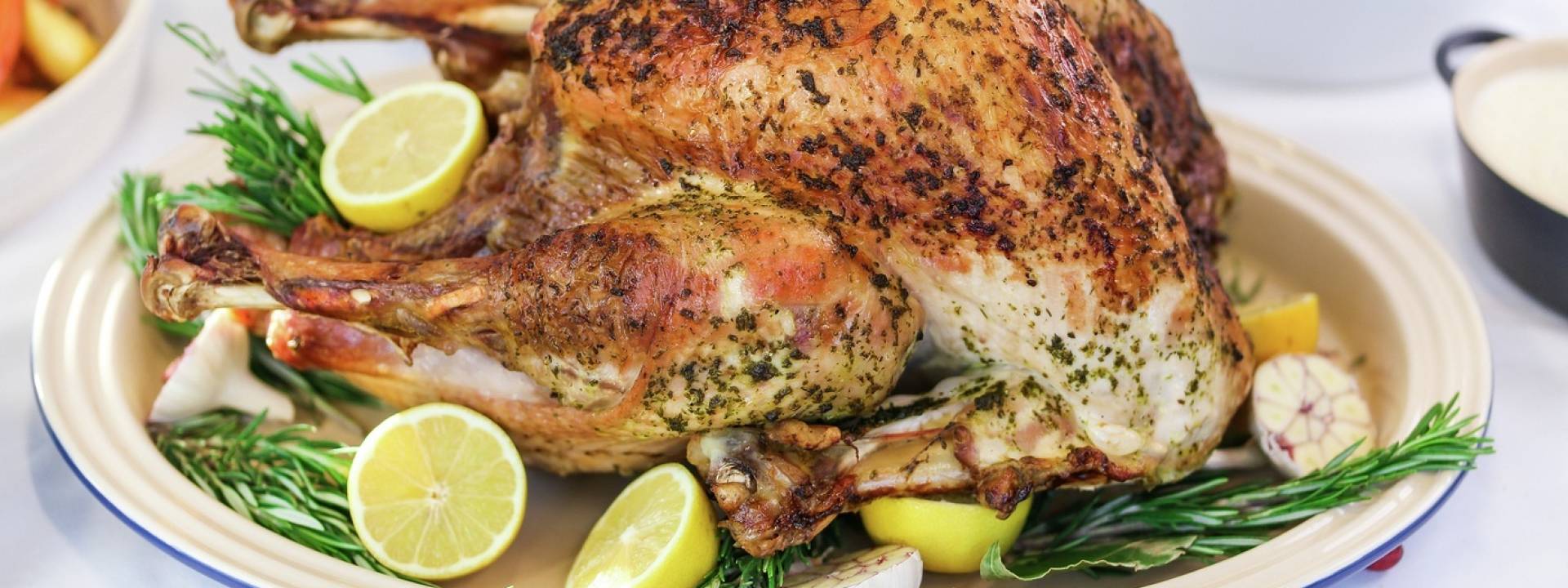Method
- Preheat the oven to 220°C/Gas 7. Meanwhile, prepare the herb butter. Put the butter into a large bowl and season with salt and pepper. Add the olive oil and mix well. Add the lemon zest and juice, crushed garlic and chopped parsley. Mix well to combine.
- Remove the giblets from the turkey cavity. Season the cavity well with salt and pepper, then stuff with the onions, lemon, garlic halves and 2 bay leaves.
- With your hands, loosen the skin on the breast from both ends of the bird so that you will be able to stuff the flavoured butter underneath it, making sure you keep the skin intact. Repeat with the skin on the legs – from the lower side of the breast feel your way under the skin and out towards the leg, loosening the gap.
- Stuff half the butter mix into the opened spaces under the skin. From the outside of the skin, gently massage the butter around the breasts so that the meat is evenly covered. Finally, insert the rest of the bay leaves under the skin of the breasts.
- Place the bird in a large roasting tray, breast side up. Spread the rest of the butter all over the skin. Season well with salt and pepper, then drizzle with a little olive oil. (If preparing a day ahead, cover the turkey with foil and refrigerate at this stage.)
- Roast the turkey in the hot oven for 10–15 minutes. Take the tray out of the oven, baste the bird with the pan juices and lay the bacon rashers over the breast to keep it moist. Baste again. Lower the setting to 180°C/Gas 4 and cook for about 2 1⁄2 hours (calculating at 30 minutes per kg), basting occasionally.
- To test whether your turkey is cooked, insert a skewer into the thickest part of the leg and check that the juices are running clear, rather than pink. As oven temperatures and turkey shapes and sizes vary, it is crucial to check your turkey about 30 minutes before the calculated roasting time. If the juices are pink, roast for another 15 minutes and check again. Repeat as necessary until the turkey is cooked.
- Transfer the turkey to a warmed platter and remove the parson’s nose, wings and tips of the drumsticks; reserve these for the gravy. Leave the turkey to rest in a warm place for at least 45 minutes; make the gravy in the meantime. Remove the bay leaves from under the skin before carving.
Gordon's top tips: Bake any stuffing separately to ensure that both the turkey and the pork stuffing are cooked properly. Another secret is to rest the turkey for a couple of hours or more. As it relaxes, the juices are re-absorbed, making the meat succulent, tender and easier to carve. It may seem like a long time, but the texture will be improved the longer you leave the turkey to rest. Piping hot gravy will restore the heat.
 Gordon Ramsay Restaurants
Gordon Ramsay Restaurants 
